Iran Disrupts Internet As It Step Up Attacks On Kurdish Cities
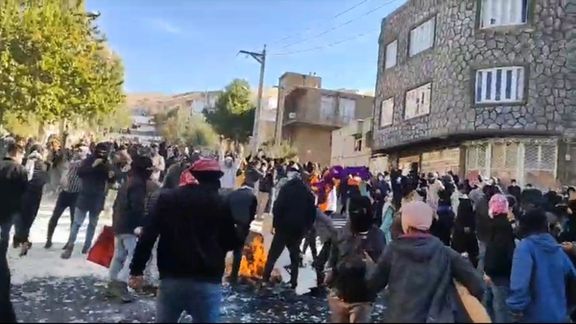
Cyberspace watchdog NetBlocks has confirmed a major disruption to internet service in Iran amid the regime’s intensified attacks on Kurdish cities.

Cyberspace watchdog NetBlocks has confirmed a major disruption to internet service in Iran amid the regime’s intensified attacks on Kurdish cities.
Netblocks that monitors cybersecurity and the governance of the Internet announced in a tweet on Monday that network traffic data show a major disruption to internet service in Iran as mobile internet is cut off for many users.
The incident comes amid a wave of new antigovernment protests and reports of casualties, mainly in the western Kurdish cities.
Several videos shared on social media on Monday showed crowds in the Kurdish-populated city of Javanrud attending to one injured man, and seeking to retrieve the body of a dead protester lying on the street.
Hengaw, a Kurdish Iranian rights group, shared a video of security forces being dispatched to the Kurdish cities of Mahabad and Bukan in dozens of pickups, motorbikes, police cars and one light armored vehicle painted black.
In the past few days, the Islamic Republic has intensified its repression on Kurdish-majority cities and towns in western provinces of the country following reports that parts of some small towns have fallen into the people’s hands. The majority of Iran's 10 million Kurds live in the western parts of the country. It has also launched repeated attacks against Iranian Kurds sheltering in Iraqi Kurdistan.
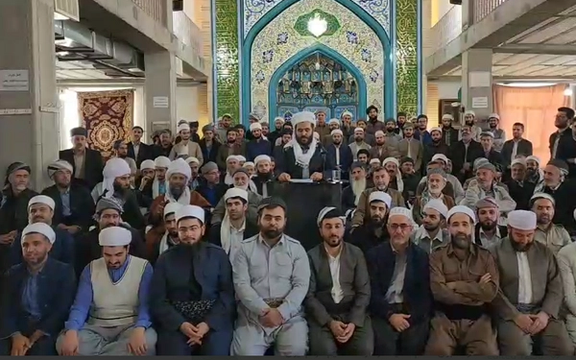
A group of Sunni religious leaders and Friday prayer Imams in Iran’s Kordestan province have called for a referendum under the supervision of international bodies in the country.
In a joint video statement on Monday, the Sunni clerics of Sanandaj and Dehgolan in western Iran called for a plebiscite with the presence of religious and national leaders, as well as neutral international observers to “get out of the current situation.”
Earlier, Molavi Abdolhamid, the top Sunni cleric of Zahedan in the southeast had also called for an internationally monitored referendum, saying by killings and suppressing protesters the government cannot push back a nation.
However, his request was met with a harsh rejection by the authorities of the Islamic Republic.
The Sunni Kurdish clerics further called for the unconditional release of all those arrested recently and warned the government against executing protesters.
"Such a terrible act will only arouse the anger of the nation,” they added.
In recent days, despite warnings by international and human rights organizations, the Islamic Republic’s judiciary issued death sentences for some protesters on charges of “War against God.”
They additionally demanded punishment of all those who were involved in killing and injuring protestors.
Ending the censorship of news and stopping the disruption of the internet and social networks are among the other demands raised in the statement.
They also expressed support for protesting students emphasizing that “the presence of security forces in schools and universities is against religion, law, and ethics.”
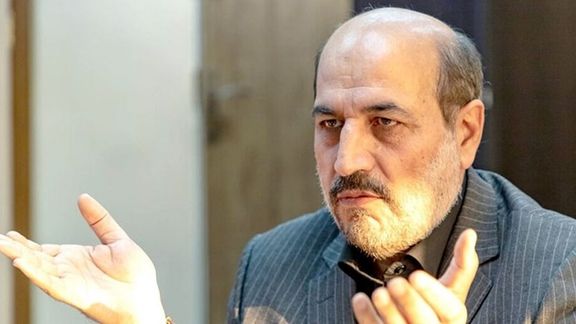
An Iranian lawmaker says the decision about removing internet restrictions depends on the country's security situation, as protests continue.
Lotfollah Siahkali, a member of the Iranian parliament, said that as long as security and intelligence organizations feel there is a problem with the country's security, they will tell the ministry of communications to continue restricting internet access and block social media apps.
Previously, Iran’s Minister of Communications, Isa Zarepour had also admitted that his ministry is not the decision-maker on this matter, in response to questions about the reason for banning Instagram and WhatsApp.
On September 20, amid the nationwide protests to the killing of Mahsa Amini by police, access to Instagram and WhatsApp applications were blocked and no government organization took responsibility.
The Iranian lawmaker also claimed that similar decisions are taken all over the world at a time of crisis but “when the crisis is over, they usually return to normal conditions.”
Meanwhile, the head of the National Security and Foreign Policy Commission of Iran’s Parliament said, “the enemy is attempting to show a turbulent image of Iran using cyberspace.”
Vahid Jalalzadeh stated on Monday that the cyberspace has become “the front line of the enemy because of the failure to follow the orders of the Supreme Leader Ali Khamenei.”
“Many years ago, the Supreme Leader stressed the need to pay attention to the virtual and cultural space of the country, which unfortunately was neglected by the officials, and today the enemy is dominating the virtual space,” added Jalalzadeh.
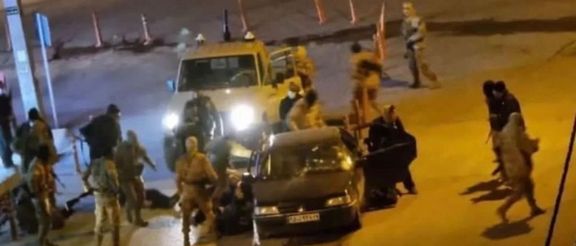
The Islamic Republic’s military crackdown on Kurdish regions can be construed as a new episode of escalating the unrest beyond Iran’s borders.
In the past few days, the Islamic Republic has intensified its repression on Kurdish-majority cities and towns in western provinces of the country following reports that parts of some small towns have fallen into the people’s hands. The majority of Iran's 10 million Kurds live in the western parts of the country. It has also launched repeated attacks against Iranian Kurds sheltering in Iraqi Kurdistan.
The regime’s security forces – particularly those trained to quell riots – used to be focused in the capital Tehran and larger cities, creating the opportunity for the residents of towns with a population of 10,000 to 200,000 to outnumber the agents of repression.
Last week, security forces, who seemed to have started losing their foothold in the cities of Izeh in Khuzestan province and Malekshahr in Esfahan province, went on shooting sprees on motorbikes at the protesters, killing at least two young boys in Malekshahr and several others in Izeh, including a 10-year-old kid. The child -- Kian Pirfalak -- immediately became a new icon of the protests. The attacks were so brutal that the Islamic Republic opted not to take responsibility and claimed terrorist has suddenly showed up and fired at both the protesters and security forces. However, the infanticide backfired and fueled more protests in other small cities.
Then came the predicament in Mahabad, a small Kurdish-majority city in West Azarbaijan province, where residents barricaded streets and moved in tactical formations to take control of the city. The Islamic Republic deployed military vehicles and cracked down on the protesters. The clashes originally erupted in the city on Friday when security forces opened fire at people who had gathered for the funeral services of some protesters killed earlier in the week. Esmail Moloudi was a young protester who was shot dead during ceremonies for the 40th day after the death in custody of Mahsa Amini. Five more protesters were killed in his funeral late in October and ever since the city has been a scene of regular clashes.
Jalal Mahmoudzadeh, the representative of Mahabad in the parliament, said on Monday that at least 11 people were killed during the past few days, noting that several of those killed were not even among the protesters.
Following the escalation in Mahabad, other cities across the country and in particular Kurdish cities held protests in solidarity with Mahabad. In addition to Kermanshah, Paveh, Kamyaran and Saqqez – the hometown of Mahsa Amini -- people in the capital Tehran, the religious city of Mashhad, Ardabil, and Orouniyeh (Urmia) as well as Kerman and Esfahan in central Iran poured onto streets to express their support for the protesters in Kurdish cities.
The Islamic Republic also renewed its attacks on Kurdish targets in the Iraqi Kurdistan region on the pretext that separatist Kurdish groups are fanning the flames of conflict in Iranian Kurdish cities by supporting the protesters.
On Monday, Iran’s Revolutionary Guards, or IRGC, said it targeted Kurdish military bases in Erbil and Sulaimaniyah, alleging factions there are fomenting unrest in Iran.
Late on Sunday, the IRGC once again launched missile attacks against the positions of the dissident Iranian Kurdish group, the Democratic Party of Iranian Kurdistan in Erbil. At least three missiles hit the party's positions including a civilian hospital, causing casualties. The IRGC also targeted the Komala Party's positions in Iraqi Kurdistan's Sulaymaniyah with drones, the party's secretary general confirmed to Iran International.
Calling on the Islamic Republic to stop this campaign, the Kurdish regional government said, “The repeated Iranian violations affecting the sovereignty of Iraq and the Kurdistan region of Iraq are unjustified and constitute a flagrant violation of international norms and good neighborly relations.” The Iraqi parliament is set to discuss the growing threats to the Iraqi territory on Tuesday.
Meanwhile, Turkey has also stepped up attacks on Kurdish targets in Iraq and Syria, a week after a bombing in Istanbul which it blames on Kurdistan Workers’ Party, or PKK, as well as Syrian Kurdish groups affiliated with it, an allegation denied by those groups. The new airstrikes -- dubbed Operation Claw-Sword – hit Kurdish bases which Ankara claims were being used to launch attacks on Turkey. On Saturday, the Kurdish-led authority in northeast Syria called on residents to unite against any possible attack by Turkey, warning that such an offensive would lead to a long war.
The United Nations Assistance Mission for Iraq said in a statement Monday that Iran's renewed attacks and the violation of Iraq's national sovereignty must be stopped immediately, noting that such violent actions increase the tension in the region and would lead to a tragedy.
Last week, Iranian Interior Minister Ahmad Vahidi, himself an IRGC commander, held a conversation with his Turkish counterpart, voicing support for “a stable and strong Turkey.” He said that Iran and Turkey have common enemies, calling for more serious cooperation in dealing with “those who make the two countries unsafe.”
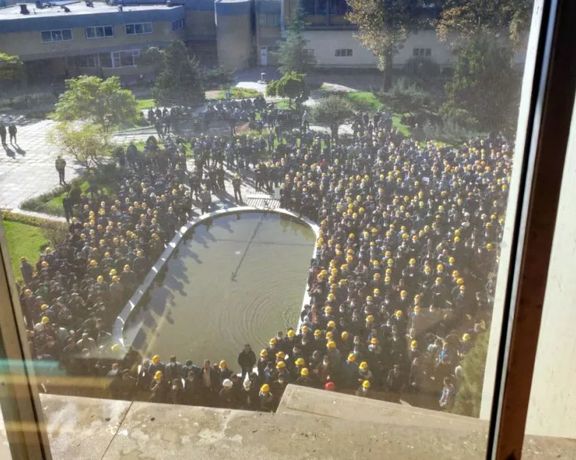
The International Trade Union Confederation has condemned repression against the people of Iran by the country's “misogynistic regime”.
The confederation issued an “emergency resolution” during a congress Monday in Melbourne, Australia, slamming the killing of hundreds and the arrest of thousands of people during nationwide protests.
“Iranian women, supported by men, have bravely protested across the country for their rights, and unions have held strikes, in the face of brutal repression. Hundreds of people have been killed, several protesters have been sentenced to death, and 15,000 have been arrested,” reads the resolution.
The confederation also slammed the systematic violation of the fundamental rights of the Iranian people, including their rights to freedom of association, as well as of freedom of speech.
“Iran is consistently ranked as among the worst countries in the world for workers' rights. Several trade unionists are serving lengthy prison sentences simply for standing up for fundamental rights,” states the resolution.
The ITUC further demanded the release of imprisoned trade unionists, and all those detained and imprisoned in blatant violation of international law.
It called on the Iranian authorities to end their violence against women and girls and to respect their rights and all the rights of all Iranians to freedom of association, and freedom of expression.
The International Trade Union Confederation (ITUC) is the world's largest trade union federation. The ITUC represents 207 million workers through its 331 affiliated organizations within 163 countries and territories.
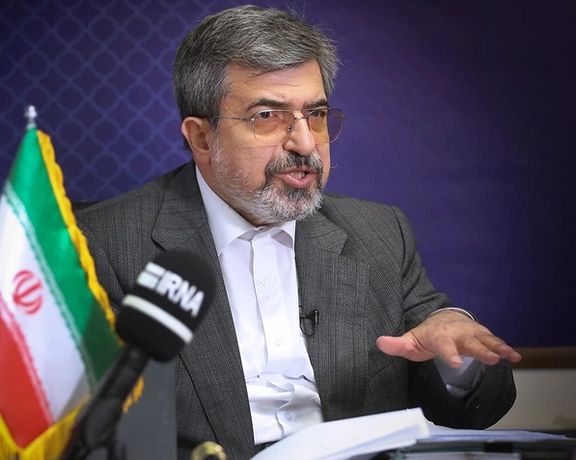
Protesters insulting religious sanctities can be condemned to death, Iran’s hardline Judiciary said Monday, citing Islamic law codified by the clerical regime.
Massoud Setayeshi, the spokesman of the Judiciary told the government news website IRNA that according to Iran’s version of Islamic law, article 513, “Those insulting Islamic sanctities or its saints” can be convicted and receive the death penalty. The principle cited is ‘Sab Al-Nabi’ or insulting the Prophet.
Islamic Republic’s Judiciary, controlled by Supreme Leader Ali Khamenei, has already convicted at least six protesters to death and it is not clear if some of them faced charges related to insulting religious sanctities. Political trials of dissidents are held behind closed doors with no transparency.
Setayeshi defended convictions arguing that existing law requires it, which can add fuel to the protesters anger, who demand a secular form of government and reject the precepts of the clerical regime.
The spokesman also argued that insulting the Islamic Republic’s flag and anthem is also punishable. He claimed that in many Western countries laws exist to punish those who desecrate the national flag or reject the national anthem.
Although in some democratic countries such as France desecrating the flag carries a fine, there are independent courts and due process of law for those charged to receive a fair trial, unlike Iran where dissidents cannot choose their own lawyers and both judges and prosecutors take orders from the Judiciary and intelligence organizations.
Tweet unavailable